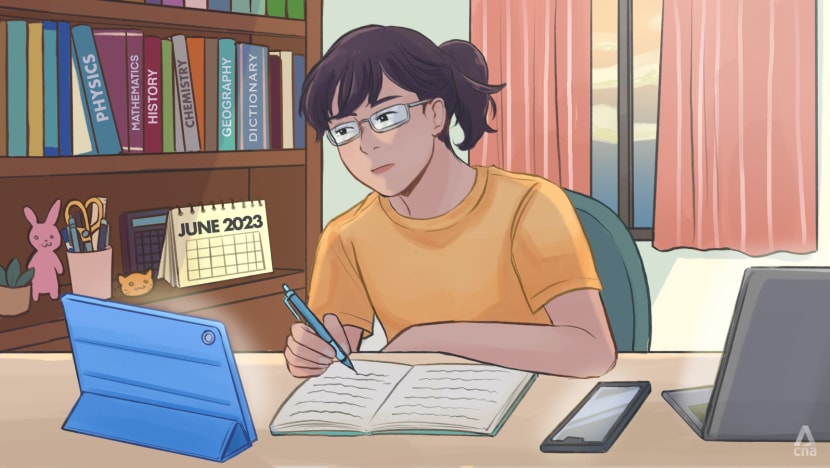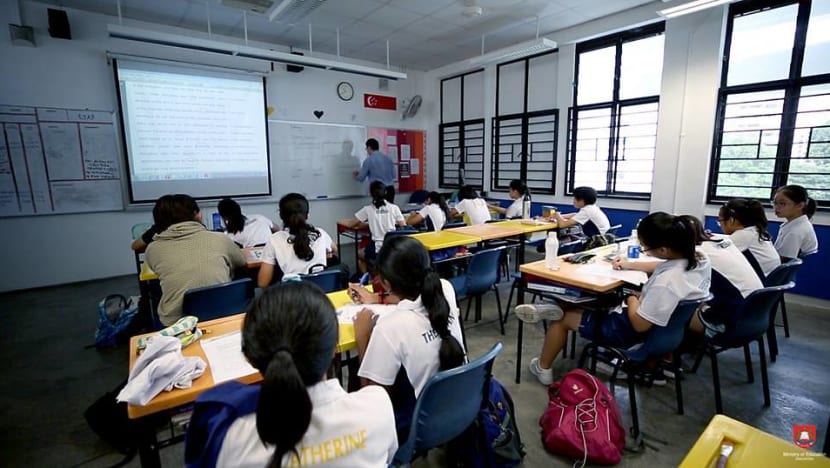IN FOCUS: Do Singapore students get enough rest during school holidays?
Term breaks are meant to give students time to rest and recharge. But with exams at the start of school terms or extra classes, assignments and tuition, do students get enough of a break?

School holidays play an important role in a child's personal growth, according to an educational psychologist. (Illustration: CNA/Clara Ho)
SINGAPORE: During the recent June school holidays, it was not all fun and games for Secondary 3 student Chua Lee-Ann.
She had math exercises, a chemistry worksheet, a Chinese composition and other online homework to complete.
“I felt stressed (about) this amount of homework, as even when I was travelling overseas I had to worry about whether I had enough time to complete my homework,” she said.
Her family was away from Singapore for about one-and-a-half weeks during the June holidays, and Lee-Ann could not complete some school assignments until after they were due.
“My teachers were quite angry because I had the whole month to do it,” she said.
Catholic Junior College student Chloe Wong, 17, remembers rushing through a lot of homework the week before school started when she was in secondary school.
This year, she did not get any holiday homework. But there was a catch – her mid-year exams were right after the holidays ended.
“I think they didn’t want to put pressure on us to have to do homework (too) so they just gave us a few revision packages which weren’t compulsory,” she said.
Chloe tried to revise an hour a day but said she found it annoying that she had to spend her holidays preparing for exams.
“On regular school days, I already spend so much time doing work, and even during weekends, I’m just trying to catch up on lectures. So I don’t have much time to relax and hang out with my friends.
“Holidays are supposed to be for me to rest but there are exams I have to deal with the moment I get back, so I get even more stressed,” she said.
Between extra classes, homework and exams looming at the start of the new term, how restful are holidays for students in Singapore?
WHY TERM BREAKS ARE IMPORTANT
It is easy to understand why students would want time to play and have fun, but experts explained that having a good break is actually important for children and youth.
“School holidays play a crucial role in balancing a child's education and personal growth,” said Ms Tan Su-Lynn, senior educational psychologist at Promises Healthcare.
“They provide essential opportunities for rest, relaxation, exploration and family bonding, all of which contribute to a child's holistic development. The purpose of school holidays for children is to provide them with a break from their regular academic routines,” she said.

Family vacations, participating in camps or visiting places of interest can broaden a child’s horizons and foster curiosity, Ms Tan said.
There may also be opportunities for independent learning.
“Children can engage in self-directed projects, pursue personal interests or undertake educational activities that interest them,” she said.
Dr Gregory Arief D Liem, an associate professor at the National Institute of Education (NIE), said creating a “psychological distance” from routine tasks can help the development of a new and more positive perspective. In the case of students, taking a break may increase their motivation.
“When we think that we adults – who are supposed to be more self-regulated in managing our stress and maintaining our well-being – do need to have a holiday to rest, recharge and rejuvenate, we can imagine how even more crucially important a holiday is for our children and youth,” said Dr Liem, who is in NIE’s psychology and child and human development academic group.
But the term break may not necessarily fulfil its purpose.
“In general, holidays are supposed to be a time where you can kind of put aside all the academics and all that, and actually focus on what you enjoy doing,” said junior college student Teo Chee Hern.
He also had examinations immediately after the holidays and spent an average of two to three hours revising every day.
“If you actually want a true holiday where you don’t do anything at all, it’s very hard to find (in Singapore), for students especially,” he said.
“IT REALLY DOES ADD UP”
Secondary 3 student Teo Chee Le attended Chinese remedial classes and had to work on a physics project during the holidays, among other assignments.
Some were optional, but he said it was better to complete them in preparation for tests in term three.
Chee Le, who is Chee Hern's brother, said he does think there is "quite a bit of homework". But he tries to finish it within the first two weeks of the month-long holiday so he can enjoy his break after.
A secondary school teacher, who declined to be named as she is not authorised to speak to the media, told CNA that she thinks students are given too much homework during the holidays.
“Probably each teacher thinks they’re just assigning one or two pieces of work or a project here and there. But it really does add up since students take many subjects,” she said.
She said there is a sense that graduating students should spend their holidays revising.
“But if we as a society are trying to move away from an emphasis on learning for examinations, then shouldn’t we encourage students to use their holidays to rest, recharge, pursue their hobbies and spend meaningful quality time with friends and family?”
A school she used to teach at also asked students to return for one week of lessons during the holidays.
“For some students, especially upper secondary students, their timetable looked like a normal week of school,” she said.
“I felt that it was basically reducing the students’ June holidays to three weeks instead of four.”
And this is before enrichment activities and tuition classes are taken into account.
Ms Tan of Promises Healthcare said these additional lessons lead to a perception that students have a significant workload, including during holidays.
This is usually worse for graduating batches, she said.
“It has been observed that students in Singapore may receive substantial amounts of homework, especially in the higher grades and in preparation for major national exams like the Primary School Leaving Examination (PSLE) and the GCE O-Level examinations,” Ms Tan said.
In response to CNA’s queries, MOE said schools have processes to monitor the homework load.
“For example, teachers in some schools list the homework they assign on the whiteboard to coordinate homework load and deadlines across subjects so that students are not overloaded."
The spokesperson said teachers may set a “judicious amount of homework” during the holidays to consolidate learning, while remedial classes are meant to give additional support to students who need it.
“Schools are also mindful to ensure that students have sufficient time to take a break from formal learning to pursue other interests, as well as to participate in social-recreational and bonding activities with their families and friends,” MOE said.
SHOULD HOLIDAYS BE HOMEWORK-FREE?
Experts who spoke to CNA said it is not as simple as declaring homework and revision are off limits during a school break.
“The ideal approach to homework during holidays should consider the specific circumstances and needs of the students,” said Ms Tan, the educational psychologist.
“Some students may appreciate the structure and routine that homework provides during holidays, while others may prefer a complete break,” she added.
It can be beneficial for students to have a moderate amount of homework that helps to reinforce learning, Ms Tan said.
“Short, focused assignments that help students review and practise what they have learnt can be valuable. This approach can help prevent the loss of knowledge and skills over extended breaks, particularly during long vacations,” she said.
Homework can also help students develop effective time management skills.
“Integrating homework into holidays should be done mindfully to ensure that students have adequate time for both their academic responsibilities and their personal growth,” she said.

Chloe, the junior college student, said she does not expect a homework-free holiday, and that assigned work can even be a motivator.
Some compulsory homework may have helped her be more prepared for the exams she had to take at the start of the new term, she said.
“I’m already super behind in all my lectures, so I kind of took this time to catch up,” she said. “Maybe a bit of homework would help me consolidate my understanding. Not a lot of homework though.”
She also said she would prefer to not have exams directly after the term break.
“I feel like if I actually had the discipline it would be super beneficial (to have the holidays to revise) but honestly I think the majority of us procrastinated most of the time anyway.
“Also, it’s a bit more difficult to get hold of our teachers during the holidays itself, so if I have any queries it’ll all be asked online, which I’m not a big fan of.”
She added that her teachers have been emphasising the importance of studying consistently, including during the holidays.
“Is that not a bit beside the point of the holidays?” she asked.
UNPRODUCTIVE HOMEWORK?
The quantity and quality of the assignments matter, said Dr Liem of NIE. Quality refers to the purpose of the assignments and how it aligns with learning objectives, as well as the student’s experience – whether it is interesting and perceived to be useful.
The effort that students put in and the mental concentration they use while doing homework is more important than the amount of time spent, he said.
Some homework can be good to help maintain the child’s intellectual functioning, he said, likening it to the importance of regular physical exercise.
“Too much homework is a big no because the amount of time that students spend on homework will take away the time they need to rest,” he said.
“After all, there are only 24 hours a day and seven days a week. Time is not an unlimited asset we have.”
The secondary school teacher who declined to be named also said forced revision can be unproductive.
“If their main goal is to finish their work so their teacher doesn’t scold them when school reopens, I question whether doing that piece of homework is even useful.
“Similarly for extra lessons, is that one or two hours of extra lessons in the first week of holidays, where students are already in holiday mood, going to contribute significantly to their learning?” she said.
But she added that teachers, especially those who teach content-heavy subjects, have to strike a good balance.
“On one hand they don’t want to give themselves more work, nor stress the students out. But on the other, they find it hard to finish the syllabus – so they end up feeling like they have no choice but to have these extra lessons,” she said.
THE ROLE OF PARENTS
As part of efforts to shift the emphasis away from testing and academic results, MOE has gradually removed mid-year examinations for primary and secondary school students.
Those entering junior colleges and the Millennia Institute from 2024 also will not have to sit for mid-year examinations. MOE said it gives guidelines on the scheduling and scope of weighted assessments.
But parents and tuition centres have turned to mock exams as an alternative method of assessment.
NIE’s Dr Liem said even if schools assign a reasonable amount of work, it is not unusual for parents to arrange for extra classes.
One parent, who wanted to be known only as Ms Yeung, signed her daughter up for two full-day classes in math and science.
Her daughter, who is in Primary 6 this year, has tuition for all four subjects, but classes were paused for two weeks during the holidays.
“I believe the extra lessons will help her in her revision,” Ms Yeung said. “She is not very motivated to revise. The class will give her some structure to revise by going through all the different topics.”
She added that her daughter could learn about answering techniques from the teachers ahead of the upcoming PSLE. This is the first time she scheduled holiday classes for her daughter.
Holiday programmes at tuition centres are not uncommon. For example, popular tuition centre The Learning Lab’s website listed intensive revision courses for Secondary 4 students throughout the holidays. For each subject, three two-hour lessons would be held.
But parents who spoke to CNA also acknowledged the importance of rest.
Ms Yeung said she asks her children to tell her what they want to do or places they want to visit during the holidays.
“We will then slot the activities in the calendar so they can balance their work and play, and everyone gets to do something they like.”
Mr Teo Wee Toon, father of Chee Hern and Chee Le, said his family goes for their annual mid-year holiday to relax.
“I think you need to have time out from a lot of studying. During term time, they are expected to study very hard to just catch up and be above average in class,” he said.
But he added that four weeks is quite a long break, and spending that time on Netflix or gaming would not be healthy either.
He said he appreciates the teachers’ efforts in organising remedial classes or assigning homework, and students probably have more time and space to catch up during the holidays if needed.
“The teachers care, to be fair,” said Mr Teo.
Overall, he said he believes rest and work should not be compartmentalised to certain times of the day or the year.
“You can actually take a break anytime throughout the day, you don’t have to wait for holidays to take a break.”
FLEXIBILITY FOR STUDENTS
Mr Teo, who owns Math Mavens Learning Centre, also tries to give his students flexibility.
During the holidays, instead of regular classes, the lessons are broken down into three revision modules. Students can choose to attend these modules in any order.
They can also decide whether to attend all three modules within one week or spread them out over three weeks.
“(This is) so that they can fit (the lessons) around their family holiday and rest time,” Mr Teo said, adding that no homework is assigned during the holidays.
He said he believes children will excel if they have a balanced lifestyle beyond studying. “Good sleep habits, diet, exercise and rest.”
The secondary school teacher who declined to be named said she tries not to give her students homework or arrange for lessons during holidays.
“Students also tend to rush all their homework at the end anyway, so I don’t see a point,” she said.
Occasionally, she assigns optional homework so students can choose whether to complete it or not.
“Perhaps for graduating classes, if the level teachers insist we give something, I might assign a maximum of one paper for them to do,” she said.
It can be helpful for students to catch up on revision during the holidays, but it should be up to them, she said.
“To me, it is perfectly fine if a student spends, let’s say, the full four weeks of the June holidays resting and pursuing leisure activities with friends and family. If they want to choose to spend their time studying, then that ought to be their choice.”
HOW TO GET ENOUGH REST
To help students have a good balance between rest and play, NIE’s Dr Liem said parents can teach their children “time blocking”.
This could be spending one quality hour doing homework without distractions, before moving on to something more fun. The more favourable activity can act as motivation to get through the homework.
Ms Tan, the educational psychologist, said students should maintain a consistent sleep schedule to regulate the body’s internal clock. Regular exercise or restful activities like reading and listening to music can also improve sleep quality.
Students should also plan ahead and work consistently to avoid leaving all the studying or homework to the last minute, she said.
“Break tasks into smaller, manageable chunks and set realistic goals for each day.”
Parents and educators can also lead by example, said Ms Tan.
“By demonstrating healthy rest habits and prioritising their own well-being, they set a positive example for students.”


















